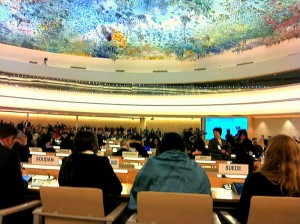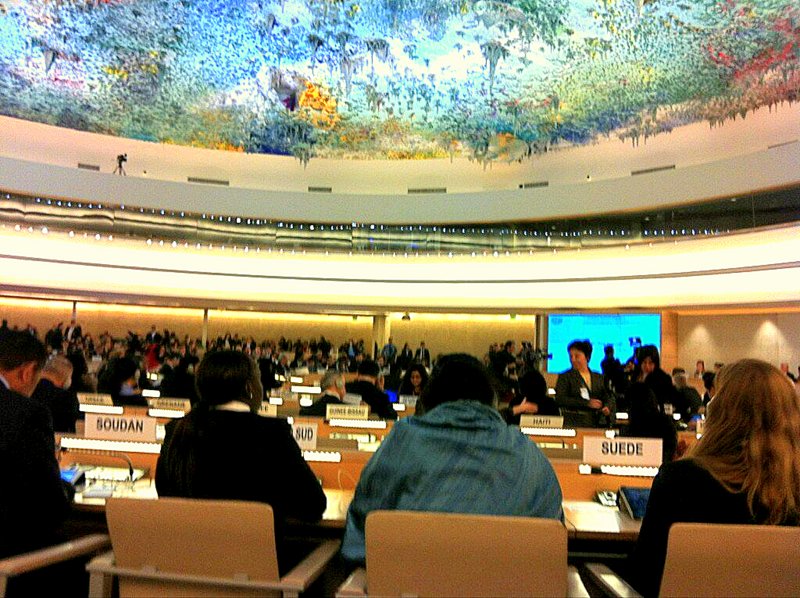The 23rd session of the United Nations Human Rights Council (the Council), which concluded on 14 June 2013, began with a special focus on Syria and the deteriorating situation in the town of Al Qusayr in particular. On 29 May, an urgent debate on Syria was held at the request of Qatar, Turkey, and the United States.
This debate came in the wake of a statement by the High Commissioner for Human Rights, Navi Pillay, in which she expressed alarm at the major military buildup around the strategic town of Al Qusayr. Pillay underlined the failure of the international community to appropriately address the worsening situation in Syria, stating: “The situation in Syria reflects a colossal failure to protect civilians. Day after day, children, women and men suffer the brutality of unbridled violence and gross human rights violations by all parties. The increasing number of foreign fighters crossing Syria’s borders to support one side or the other is further fueling the sectarian violence, and the situation is beginning to show worrying signs of destabilizing the region as a whole.”[1] Pillay further stressed the need to refer the situation to the International Criminal Court (ICC) to prevent the continuation of abuses and to put an end to the prevailing culture of impunity enjoyed by perpetrators of war crimes and crimes against humanity in Syria.[2]

Photo by: Paola Daher, CIHRS
At this session, CIHRS partnered with a number of prominent Syrian human rights defenders as well as the Euro-Mediterranean Human Rights Network to draw the attention of the international community “to the suffering of the Syrian people and to urge the international community to take urgent steps to stop the grave violations being committed against civilians in the country, including by referring the situation in Syria to the International Criminal Court.”[3]
Despite the numerous calls to explicitly refer the situation in Syria to the ICC, the resolution produced following the urgent debate, and which passed with 36 yes and 8 abstentions,[4] fails to call on the UN Security Council to refer war crimes and crimes against humanity in Syria to the international criminal court.[5]
“The Council should have echoed the voice of the High Commissioner by calling on the UN Security Council to refer the situation in Syria to the International Criminal Court. The failure to do so reinforces impunity in Syria and will only embolden those committing human rights violations in the country,” said Jeremie Smith from the Geneva office of the Cairo Institute for Human Rights Studies.
The Council also addressed the situation of human rights in Palestine, particularly in light of the continued expansion of Israeli settlements. In his report to the Council, the Special Rapporteur on the situation of human rights in the Palestinian territories occupied since 1967 expressed his concern at “Israel’s consistent and systematic expansion of settlements” which he described as “hav[ing] created fundamental threats to the Palestinian right of self-determination,” adding that “Israel continues to flout, with total impunity, international humanitarian law, including its obligation…not to transfer its population into the occupied territory.”[6]
In statements to the Council, state members and civil society groups, including CIHRS, further condemned the Israel’s non-cooperation with the Special Rapporteur and with the Council itself,[7] calling Israel’s refusal to undergo its Universal Periodic Review an attempt by Israel to “[avoid] rigorous criticism of its violations of international law.”[8]
At this session, CIHRS also shed light on the continuing violations to human rights in Egypt, a trend that is hindering Egypt’s transition to a democratic state governed by rule of law. CIHRS highlighted how fundamental rights, including the freedoms of association and of peaceful assembly, are currently being targeted by repressive bills, while freedom of expression and the media have been increasingly targeted since President Morsi came to power. Furthermore, cases of violence and other violations against women, human rights defenders, minorities, and journalists have seen no serious investigations or attempts by the government to put an end to such occurrences.
Ironically, despite sharp criticisms regarding its human rights record, the current government of Egypt co-sponsored a resolution on the protection of human rights defenders at the Council’s previous session. At the current session, Egypt was again one of the main sponsors of a resolution on the role of freedom of opinion and expression in women’s empowerment. “It is high time that the Egyptian government start implementing at home the principles behind the resolutions it has championed internationally: protection for human rights and those who defend them, freedom of expression, and women’s empowerment cannot be achieved amidst the environment that has been cultivated by the Egyptian government domestically. By threatening Egyptian civil society, attacking journalists and others who express their opinions freely, and allowing acts of violence against women and minorities to go unpunished, the Egyptian government is blatantly contradicting the international commitments which it is simultaneously supporting in the international arena,” stated Paola Salwan Daher, UN advocacy representative at the Geneva office of the Cairo Institute for Human Rights Studies.
Many states similarly expressed their concern about the current situation of human rights in Egypt, including the United States,[9] Sweden,[10] the European Union,[11] and Switzerland.[12] Significantly, Germany, Norway, and the USA delivered a joint statement[13] before the Council in which they expressed that they are “deeply dismayed by the sharp rise over the past two years in legal action against individuals for expressing their opinions and beliefs,” pointing out that such acts are “inconsistent with Egypt’s obligations to protect freedom of opinion and expression under the International Covenant on Civil and Political Rights.”
The statement further expressed broad concerns about the state of civil society in Egypt, condemning the recent court verdict which sentenced 43 Egyptian and foreign NGO workers to prison as “politically motivated” and in “contradict[ion of] the Government of Egypt’s commitments to respect and protect the right to freedom of association and to support the role of civil society in Egypt.” The statement also raised concerns about the repressive nature of the bill on associations recently presented by the Egyptian presidency,[14] asserting: “The current draft law on associations would impose significant government controls and restrictions on the activities and funding of civic groups,” and that passage of this law would “discourage the exercise of the freedom of association” and “impede the ability of Egyptians to form the civic groups that are vital to Egypt’s development and democratic transition.”
According to Ziad Abdel Tawab, deputy director of CIHRS: “Egypt is at a crucial moment in its history, and as such civil society should be freely allowed to play a strong role in supporting the creation of a state that respects democratic principles and human rights. While the responses by member states to the situation in Egypt are positive, it is paramount that the Human Rights Council continue to monitor whether or not the Egyptian government upholds its obligations under international law to respect and promote human rights. Stronger action will be needed to match the urgency of the situation on the ground.”
[4]https://extranet.ohchr.org/sites/hrc/HRCSessions/RegularSessions/23rdSession/Resolutions/The%20deteriorating%20situation%20of%20human%20rights%20in%20the%20Syrian%20Arab%20Republic,%20and%20the%20recent%20killings%20in%20Al-Qusayr/Voting%20Results.pdf
[5]https://extranet.ohchr.org/sites/hrc/HRCSessions/RegularSessions/23rdSession/Resolutions/The%20deteriorating%20situation%20of%20human%20rights%20in%20the%20Syrian%20Arab%20Republic,%20and%20the%20recent%20killings%20in%20Al-Qusayr/English.doc
[6] http://www.ohchr.org/Documents/HRBodies/HRCouncil/RegularSession/Session23/A-HRC-23%20-21_en.pdf
[8] https://cihrs.org/wp-content/uploads/2013/06/oral-intervention-about-the-occupied-Palestinian.pdf
Share this Post

